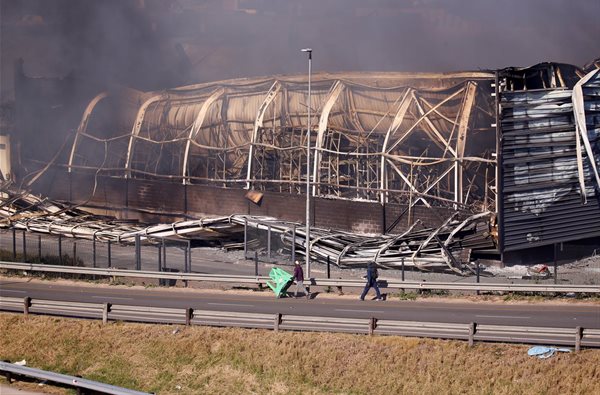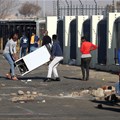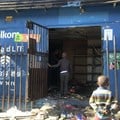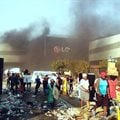Multiple retailers and shopping centres in Gauteng and KwaZulu-Natal have limited their operations or closed their doors temporarily as civil unrest and looting continues.

People queue to buy food at a supermarket with many stores staying closed as protests continue. Source: Reuters/Rogan Ward
The riots, initially sparked by protests against former president Jacob Zuma's incarceration, have led to the deaths of at least 72 people. Ten of these deaths occurred during a stampede at the looted Ndofaya Mall in Soweto on Monday evening.
Many shopping centres in the two provinces have been left empty or in ruins, including Umlazi Mega City in the south of Durban, Watercrest Mall in Hillcrest and Jabulani Mall in Soweto. Naledi Mall in Vosloorus and Brookside Mall in Pietermaritzburg were also set alight on Monday by looters.

Brookside Mall burns after being looted. Source: Reuters/Rogan Ward
Limited trading
Some residents in affected areas in KwaZulu-Natal have reportedly struggled to acquire basic groceries, due to stores being shut as a result of vandalism or as a precautionary measure. Stock shortages have also occurred due to supply chain and logistical disruptions.
Retail group Massmart has been hard hit, as looters made off with goods ranging from groceries, to liquor, electronics and furniture from at least 30 Makro and Game stores. A Massmart distribution centre in KwaZulu-Natal was also destroyed. Stores in affected areas have therefore been shut until the situation improves.
Meanwhile, Clicks has closed more than 200 stores in KZN, Gauteng, and other affected areas in Limpopo, Mpumalangu, North West and the Free State. Dis-Chem also announced the temporary closure of all KZN stores as well as those in Gauteng protest hotspots.Some of the country’s largest grocery retailers have needed to limit operations in areas where protests are occurring to safeguard property, stock and staff well-being.
In a statement shared with Bizcommunity, David North, chief strategy officer at Pick n Pay, said, “In common with other retailers, some of our stores have been affected by the disruption and damage in Kwa-Zulu Natal and Gauteng. The safety of our customers and staff is always our first priority, and, as a precaution, we have temporarily closed a number of stores in the affected areas.”
Several of the Shoprite Group’s stores in KwaZulu-Natal and Gauteng have been unable to trade due to the threat of damage and violence. “The Shoprite Group strongly condemns the unrest and mayhem in parts of the country where looting and lawlessness broke out amidst protest in KwaZulu-Natal and Gauteng. It is especially damaging after the dire impact of the Covid-19-pandemic on the economy with unemployment at record highs and South African consumers under tremendous pressure and livelihoods under constant threat."
“We denounce the criminal acts of violence, looting and damage to property. It puts the lives and safety of millions of South Africans at risk and brings further food security challenges in South Africa,” the supermarket chain said.
In a statement issued by the Franchise Association of South Africa (Fasa), Tony Da Fonseca, a past Fasa chairman and the CEO of the OBC Group with supermarkets across the country and in vulnerable areas, said that the group lost more than 10 of its stores in KZN and Gauteng.
“Food security is going to be an issue in the coming weeks as retailers are forced to close which will impact all communities across the country. The destruction, not only to retailers and property, but to the very infrastructure and basic services such as supplies to hospitals and water security in the coming days is cause for alarm,” Da Fonseca said.
Woolworths confirmed that some of its stores have been closed due to the protest action, and operations will resume once it is safe to continue to trade. While telecommunications company Telkom announced on Tuesday that it opted to close all its stores across the country as a precautionary measure.
In addition to the large chains, small independent retailers and spaza shops have also been gravely affected by the violent protest action, with some business owners losing the bulk of their stock and equipment.
Masego Mafata 13 Jul 2021 Security measures "insufficient"
While the deployment of 2,500 members of the South African National Defence Force has commenced to assist the South African Police Service, some business associations have described the government's response to the protest action as inadequate.
Freddy Makgato, the newly elected CEO of Fasa, said, “We are extremely concerned by the insufficient security response that is meted out taking into account the level of violence and destruction taking place. We call on government to make sure that proper security is provided in ensuring that private property, infrastructure and the safety of our people is guaranteed.
"Should this state of affairs be allowed to continue, most and major businesses may not be able to recover and people will in all likelihood lose their jobs and the economy will come to a standstill as it is already in dire straits.”
The National Clothing Retail Federation (NRCF), whose members include TFG, Mr Price, Truworths, Woolworths, Pick n Pay Clothing and Queenspark said in a statement on Tuesday that it:
• Supports calls for the security cluster of national government to declare a State of Emergency, regionally or nationally;
• Encourages the president as commander in chief to tenfold ramp up the available security personnel and equipment deployed in crisis areas;
• Requests consideration that government enforce a hard lockdown of at least 48 hours in key affected zones.
"Further, government is asked to ensure that Sasria administration services and infrastructure are ramped up to speedily process legitimate claims and ensure that the economic impact is not further disrupted by unnecessarily lengthy claims processes and pay-outs," said the NRCF.














































